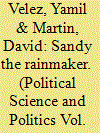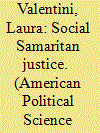| Srl | Item |
| 1 |
ID:
121626


|
|
|
|
|
| Publication |
2013.
|
| Summary/Abstract |
The arrival of Hurricane Sandy within a week of the 2012 presidential election caused unprecedented disruption to the final days of the campaign and Election Day in areas that were affected. The precise impact of the storm on those areas hit hardest was not necessarily clear. Contrary to prior research on the effect of disasters on electoral outcomes, we find that the president's vote share was ultimately increased in storm-affected areas by about four percentage points, plus or minus two points. While those states most heavily affected were unlikely to give their electoral vote to Romney because of other factors, we present counterfactual analyses that show that such a storm could have had a significant impact on swing states: although the storm only affected some areas, we show that Virginia would likely have been won by Romney were it not hit at all, whereas North Carolina would likely have gone for Obama had it been directly in the storm's path.
|
|
|
|
|
|
|
|
|
|
|
|
|
|
|
|
| 2 |
ID:
143143


|
|
|
|
|
| Summary/Abstract |
In late 2012, Hurricane Sandy hit the East Coast of the U.S., causing much suffering and devastation. Those who could have easily helped Sandy's victims had a duty to do so. But was this a rightfully enforceable duty of justice, or a nonenforceable duty of beneficence? The answer to this question is often thought to depend on the kind of help offered: the provision of immediate bodily services is not enforceable; the transfer of material resources is. I argue that this double standard is unjustified, and defend a version of what I call “social samaritanism.” On this view, within political communities, the duty to help the needy—whether via bodily services or resource transfers—is always an enforceable demand of justice, except when the needy are reckless; across independent political communities, it is always a matter of beneficence. I defend this alternative double standard, and consider its implications for the case of Sandy.
|
|
|
|
|
|
|
|
|
|
|
|
|
|
|
|